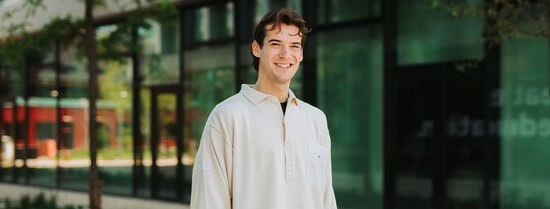On this page you’ll find information on activities and possibilities during your studies. For example, you will kick off your studies with a series of introduction activities to get to know your fellow classmates, your lecturers, and the Erasmus University Rotterdam. Furthermore, when you scroll down, you can find more about the possibilities to personalise your bachelor.
Year 1: introduction activities
What better way to get to know your fellow students and Erasmus University Rotterdam than during the introductory activities organised by ESHCC? We organise multiple activities, such as an official welcome session, social meetups, and the Freshers Experience Day and of course you'll get to know the campus and the academic systems and resources you'll work with during your studies.
Year 2 and 3: personalise your study
In year 2 and 3, you get many opportunities to personalise your bachelor. Scroll down to learn about the different options.
As a student of the International Bachelor Arts and Culture Studies, you will do a compulsory internship in your second year. This internship allows you to apply your theoretical knowledge in real-world arts and culture settings, while also building a professional network. Students before you already did internships at:
If you’re not going on exchange, you will follow a minor. You can opt for a minor at Erasmus University Rotterdam but a minor at a different university is an option as well. Minors allow you to explore different fields of study, helping you to broaden your professional scope. But you can also choose a minor on a specific cultural topic such as art crime or the popular music industries.
You will complete your bachelor by writing a Bachelor Thesis on a subject of your choice, under supervision of one of our experienced staff members. Students before you wrote their thesis on subjects such as NFTs in the art world, interactive museums, festival audiences, representation in hip hop culture, or the rise of international art markets.
Do you have a talent for art or music, next to your hunger for academic knowledge? Then you can combine the International Bachelor Arts and Culture Studies with a programme at the Willem de Kooning Academy or Codarts. The Dual Degree in Arts and Sciences (RASL) is perfect for those who want to simultaneously practice and study the arts. You can find more information about the Dual Degree programme here.
You can complement IBACS with a second bachelor in philosophy of a Specific Discipline after your first year. You will obtain both bachelor degrees in four years. Guided by dedicated lecturers, you will delve into various philosophical topics, ranging from the philosophy of the Enlightenment to post-modern continental philosophy and from ethics to philosophy of science. You will learn to express arguments clearly and to think critically and creatively.
For ambitious and talented students, we offer more academic challenges, more opportunities to delve deeper into particular topics, and the chance to work in small groups with an arts organisation on an actual case. Our Arts and Culture Honours Programme (15 EC) allows a limited number of IBACS students to take up these challenges.
The honours programme aims to deepen and broaden the subject material of the regular curriculum. This takes place by an in-depth reading of academic texts, discussing these works with the lecturer and fellow students, and producing a paper or other type of report or presentation at the end of each theme. Each lecturer involved is responsible for three seminars dealing with a current topic in her or his area of expertise. Finally, students will do a project embedded within a (Rotterdam) arts organisation and present their findings at a final symposium.
Students investing fully in the honours programme will be able to:
- understand and compare complex academic texts on contemporary topics in arts and culture studies;
- gain insight in the complex relation between theory and empirical research;
- apply their new knowledge and skills, both within an academic context (through assignments) and within a societal context (through the honours research project).
